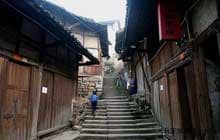
 Chengdu , in western China , is the capital of Sichuan Province (former spellings included Szechwan and Szechuan ). The province is known throughout China and the world, for its spicy food, pandas, tea drinking habits, and hot pot. The basin in which Chengdu sits is surrounded by a ring of mountains that formed a natural obstacle to traders and attackers for centuries. For many years the most accessible route into the Sichuan Basin was to brave the perilous shoals of the Yangzi River . Even during the Tang dynasty it was still such a hazardous journey that one of the most famous of Chinese poems from that period begins: "The road to Shu is hard" – Shu being the name of an old kingdom whose capital was Chengdu. This relative isolation from the rest of the Chinese world has meant that at times the Sichuanese have had independent kingdoms, and sometimes their cultural affiliations have been stronger with their neighbours outside the borders of the Chinese world than with the Chinese world itself. To this day the rest of China recognises the special characteristics of the region, and the Sichuanese people are regarded as relaxed and friendly.
Chengdu , in western China , is the capital of Sichuan Province (former spellings included Szechwan and Szechuan ). The province is known throughout China and the world, for its spicy food, pandas, tea drinking habits, and hot pot. The basin in which Chengdu sits is surrounded by a ring of mountains that formed a natural obstacle to traders and attackers for centuries. For many years the most accessible route into the Sichuan Basin was to brave the perilous shoals of the Yangzi River . Even during the Tang dynasty it was still such a hazardous journey that one of the most famous of Chinese poems from that period begins: "The road to Shu is hard" – Shu being the name of an old kingdom whose capital was Chengdu. This relative isolation from the rest of the Chinese world has meant that at times the Sichuanese have had independent kingdoms, and sometimes their cultural affiliations have been stronger with their neighbours outside the borders of the Chinese world than with the Chinese world itself. To this day the rest of China recognises the special characteristics of the region, and the Sichuanese people are regarded as relaxed and friendly.
Chengdu has had a poetic history, known sometimes as the ' Brocade City ' for an official who was in charge of that industry in the city, and also as ' Hibiscus City '. It is famous in the Chinese imagination for serving as the capital of one of the three states that made up the Three Kingdoms Period (222-263), and thus it features strongly in the most famous Chinese political drama ever told, the Romance of the Three Kingdoms . The allure of Chengdu was such that the two most famous Chinese poets both called it home for some time. The province was also the birthplace for the invention of paper money, and in recent years, reprising its independent character, it was the last major city in China to hold out against the Communists.
Once characterized by wooden buildings and teahouses, it has witnessed the same vicissitudes that nearly every other major city in China has gone through in the past fifty years: first the periodic communist leveling of much of the old architecture, and what wasn't removed under the guise of Marxism-Leninism-Mao Zedong Thought has been done away with in the process of rebuilding the entire country that began in the 1980s. Nonetheless, cultural habits do not change overnight, and despite there being another ten million people in the vicinity the city feels much more relaxed than does Beijing or Shanghai – there are still tea houses, such as those in the People's Park, where you can pull up a chair and chat the afternoon away, before heading off to dinner at one of the many restaurants that specialize in hotpot or marvelous fresh Sichuanese cuisine.